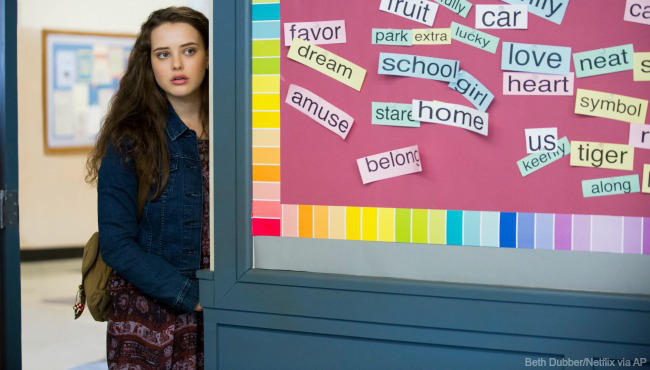13 Reasons Why: important conversations parents should be having with their children
Photo by Beth Dubber/Netflix
Hannah Baker is the main character of Netflix series 13 Reasons Why, chronicling what drove this character to suicide
Parents and their children can sometimes be speaking different languages when it comes to understanding what is going on in the other’s head. A recently popular Netflix series brings up the debate on the possible harm of this disconnect, and whether or not adults should pay more attention to the product their kids are consuming.
Prompted by the popular but controversial Netflix series “13 Reasons Why,” the student services team sent a note to parents last week about how to talk to their kids about suicide.
“We, as the student services team, thought it was best to inform parents about the intense content of the series,” Sheila Tanner, social worker, said. “It was important to remind families that there is help in the school and resources in the community that can be provided to their kids.”
The series, based on a novel by the same name, centers around a high school student who commits suicide, leaving audio recordings for all those she believed ultimately caused her death. Since its release late March, the show has drawn criticism from individuals who say the show romanticizes suicide and could be dangerous for vulnerable youths.
“I think the show contributes a lot to some of the stigmas and stereotypes pertaining to suicide and depression,” Reese Vargo, junior, said. “The show doesn’t necessarily handle the subject matter in an appropriate way and it can give young people the wrong idea about suicide.”
According to Vargo, the addition of romantic subplots and heightened drama surrounding something as serious as suicide is a way for studios to make more money. What they do not care about, she said, are the negative effects these story lines could have on their audiences.
“The show perpetuates this myth that ‘true love’ can cure depression, as the main character is shown pining after the girl he lost because she killed herself,” Vargo said. “Somebody that’s depressed can very easily see this show and think, ‘Wow. That’s so romantic. I should do the same thing!’”
Duncan McMillan, junior, argues that the show does tackle the subject matter of depression and suicide appropriately. According to McMillan, certain things are dramatized, but that is because it is television, and it does not take away from all the things the show does right.
“I think the show exposes bullying at schools and all the things your peers could be going through that you don’t even know about,” McMillan said. “So I think it’s making kids smarter about how they treat people and showing them just how terrible suicide can be.”
While the letter does not explicitly state that the show promotes or glamorizes suicide, it does tell parents that, “while many youth are resilient and capable of differentiating between a TV drama and real life, engaging in thoughtful conversations with them about the show is an opportunity to process the issues addressed, consider the consequences of certain choices, and reinforce the message that suicide is not a solution to problems and that help is available.”
“The letter makes parents aware of things they should already be looking for, like warning signs of depression and suicidal ideation,” Tanner said. “They should be conscious of changes in their child that may represent a downward spiral or enough to cause concern that could lead to steps of intervention.”
Despite having different opinions on the show, both Vargo and McMillan agree with Tanner and the purpose the letter serves. As the topic of suicide is being brought to the forefront by the show, Vargo said, conversations about mental illness can give their kids the support they need.
“I think if parents feel concerned then there may be a good reason for this,” McMillan said. “The district did the right thing by sending out a letter because it lets people know what’s going on and it could spark a conversation between parent and child that could end up being extremely beneficial. Whether you like the show or not, it encourages a necessary conversation.”

The most important thing you need to know about Ria is that Shonali is her real name. This will be her second year on staff as the co-editor of Bear...

